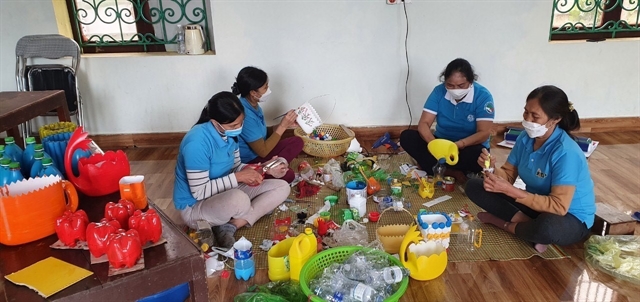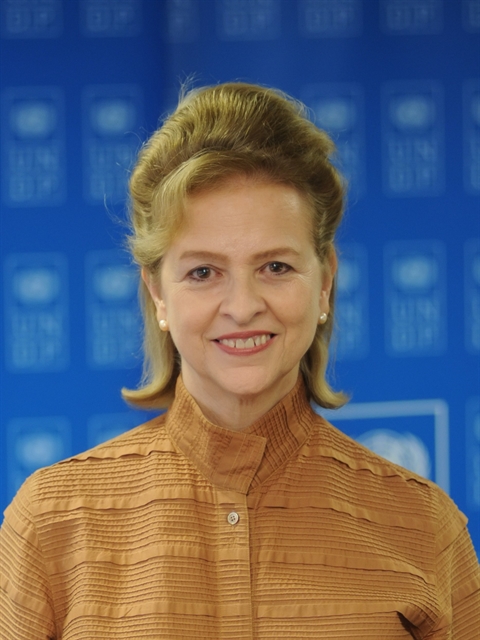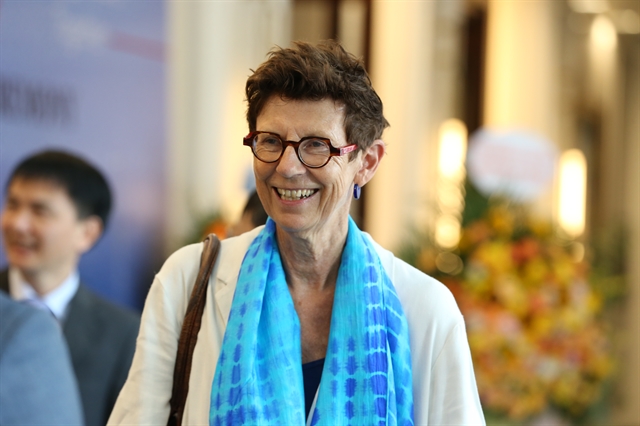 Opinion
Opinion

As global momentum builds on ending plastic pollution and marine debris, Việt Nam is strengthening its ability to build forward better from COVID-19 and transition to a circular economy.

|
| Women in central Thanh Hoá Province recycle plastic waste into decorative items for sale. Money collected will be given to local poor women and children. — VNA/VNS Photo |
Caitlin Wiesen and Grete Løchen *
Globally combined, we dump the equivalent of one garbage truck of trash into our oceans every minute. Based on current projections, the amount of plastic trash in the oceans will double by 2030 and nearly triple by 2040 to 29 million metric tonnes per year – left unchecked, there will be more plastic in our oceans than fish.
Plastic pollution is disrupting food chains vital to animal and human health, and in turn accelerating the heating of the Ocean. It has to stop. Which is why 175 countries came together at the UN Environment Assembly in Nairobi earlier this year with plastic pollution and marine debris as an urgent shared priority. On the final day, the resolution “End Plastic Pollution: Towards an Internationally Legally Binding Instrument” was confirmed.
An international agreement of this kind is unprecedented. It is specifically designed to promote sustainable production and consumption of plastic, as well as sound waste management, circular economy approaches, reporting measures, compliance, and financial mechanisms to support implementation.
It’s a milestone in the efforts to protect planet earth. But it’s late, and there’s still lots of work to do globally, regionally and also nationally here in Việt Nam, where an estimated 730,000 tonnes of plastic enters the ocean every year, placing Việt Nam as one of the top five marine plastic waste contributors in the world.
Proactively making change
The economy of the sea and coastal provinces and cities of Việt Nam — which has a long coastline of more than 3,260km — accounted for approximately 47-48 per cent of the country's Gross Development Product (GDP) as of 2016 and is expected to contribute up to 65-70 per cent of GDP by 2030. Which is why Việt Nam is taking ocean health seriously, as evidenced by its national goal of reducing 75 per cent of its marine plastic by 2030 and revisions to the Law on Environmental Protection (LEP), which becomes effective in 2022.

|
| Caitlin Wiesen, UNDP Resident Representative in Việt Nam. — Photo courtesy of the UNDP |
Along with the action plan to eliminate single-use plastics and non-biodegradable plastic bags from all coastal tourism areas, the revised law includes a transition from the traditional linear economy – make, use, discharge – to a circular economy, designed to reduce the exploitation of materials, extend the lifespan of products and reduce waste and adverse environmental impacts with innovations and recycling.
At the COP26 meeting in Glasgow last November, Prime Minister Phạm Minh Chính stressed the need for Việt Nam to transition towards a green, circular, sustainable, inclusive, and humanistic economy. As Việt Nam looks to build forward better from COVID-19, it’s time to work towards climate action, circular economy and gender equality together as interconnected issues.
Việt Nam’s informal waste workers – typically low-paid women from rural areas or ethnic minorities who collect waste for recycling – are already playing a key role in working towards a circular economy but they must be included in policy formulation and given access to financial and technical resources. In 2021, the Norwegian Embassy and UNDP signed the agreement for a new project ‘Scaling-up Integrated and Inclusive Waste Management Models through Empowering the Informal Sector and Fostering the Circular Economy’ — a three-year project that is deploying and testing interventions, including a management model in the fishery sector, and an ecosystem-approach to value chains through the establishment of a Material Recovery Facility. The project aims to increase the livelihoods of waste workers by collaborating with Norwegian tech company Tomra Systems to use sensor-based waste sorting solutions, and scale up sustainable and inclusive waste management models and interventions through replication support, capacity development and knowledge-sharing.
The Ending Plastic Pollution Innovation Challenge (EPPIC) also spearheaded by UNDP, with support from the Norwegian Ministry of Foreign Affairs and the Norwegian Agency for Development Cooperation (Norad), is an ASEAN-wide competition calling for innovators to share bright ideas for tackling plastic pollution that solve coastal city challenges. One winning solution was the Breathable Biobag in Việt Nam — a biodegradable bag made from tapioca starch to reduce plastic and food waste from Việt Nam’s fruits and vegetable export chain — and a winning innovation in Thailand promoting the circular economy with a technology solution that turns food waste packaging into reusable aluminium.
Keeping momentum
Norway has a highly developed Blue Economy and, like Việt Nam, is a coastal nation heavily affected by climate change. Both countries have a shared interest in keeping our oceans healthy and productive. We must manage the ocean and our national waters in a sustainable way. Norway and Việt Nam both rely on and utilise the marine resources and understand the importance of a healthy and sustainable ocean to ensure food and energy for a growing, global population in the years to come. There is great potential for increased cooperation between Norway and Việt Nam, especially in areas such as the circular economy, and ocean industries such as marine aquaculture and renewable energy (offshore wind). To this end, the two governments will co-chair an International Conference on Sustainable Ocean Economy and Climate Change Adaptation on May 12 and 13, 2022 with the support of UNDP in Việt Nam.

|
| Grete Løchen, Norwegian Ambassador to Việt Nam. — Photo courtesy of the UNDP |
Building on last year’s COP26 and contributing to the momentum towards the 2022 UN Ocean Conference in Lisbon in late June, it will take place in Việt Nam and online, and bring together ministers and senior officials from climate-vulnerable countries as well as donor countries, international organisations and experts. The conference will be opened by a Government leader of Việt Nam and will be co-chaired by Anniken Huitfeldt, Norway’s Minister of Foreign Affairs and by Trần Hồng Hà, Việt Nam’s Minister of Natural Resources and Environment. It will feature keynote addresses by UNDP Administrator Achim Steiner and by the United Nations Secretary General’s Special Envoy for the Ocean, Peter Thomson.
Delegates will use this conference as a crucial opportunity to discuss solutions for a resilient ocean economy, including the global plastics treaty and how participating countries can play their part – with Việt Nam as a front runner – to rapidly progress this landmark resolution. — VNS
* Caitlin Wiesen is UNDP Resident Representative in Việt Nam and Grete Løchen is Norwegian Ambassador to Việt Nam




